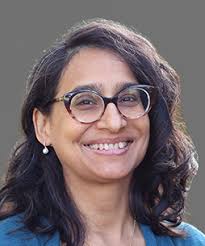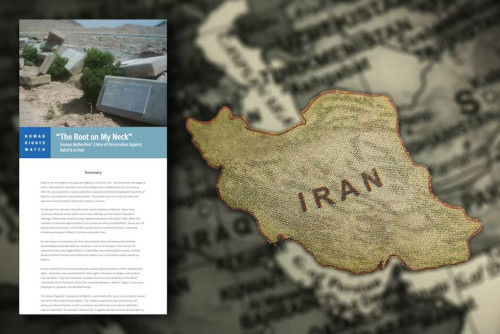The Baháʼí Experience: Religious Community and Social Change
 Selvi Adaikkalam Zabihi
Selvi Adaikkalam Zabihi
Toward this end, I offer insights drawn from the experience of the worldwide Baháʼí community, which has, for over a century and a half, been consciously seeking to advance the transition toward a more mature global civilization. Through a diversity of actions pursued within a coherent framework, the Baháʼí movement has generated a rich body of insight that is relevant to the questions we are considering in this forum.
To provide some background, the Baháʼí response to the needs of our time was set in motion by the spiritual and social teachings of Baha’u’llah, who was a prisoner of the Persian and Ottoman empires from 1853 until his death in 1892. Baha’u’llah articulated a vision of humanity struggling through a tumultuous transition toward a more mature global order, based on a recognition of our organic interdependence and a complete reconceptualization of our relationships with one another and with the earth.
“The winds of despair,” he wrote, “are, alas, blowing from every direction, and the strife that divideth and afflicteth the human race is daily increasing. The signs of impending convulsions and chaos can now be discerned, inasmuch as the prevailing order appeareth to be lamentably defective….Soon will the present-day order be rolled up, and a new one spread out in its stead….The earth is but one country, and mankind its citizens.”
In response to Baha’u’llah’s teachings, the Baháʼí community has been steadily advancing a movement that now spans the globe—reaching from metropolitan centers to remote villages, and comprising a microcosm of humanity. We see our efforts as part of a wider movement of movements, all contributing in distinct and complementary ways to the emergence of a future in which every individual and social group can flourish, in harmony with nature, and human diversity can be recognized as the ultimate source of our shared prosperity.
Thus, Baháʼís collaborate with like-minded efforts as an important part of our work. At the same time, we are learning, within a shared framework, how to pursue complex, dynamic, synergistic processes of social change. Insights generated in this way might shed light on the question of how to advance a wider movement of movements.
The Baháʼí approach to social transformation includes a commitment to coherence between the means and ends of change because the means of every movement prefigure its ends. The ends sought by Baháʼís are a peaceful and sustainable global civilization that embodies the principle of the organic oneness of humanity in all its diversity, and is organized according to the principle of justice. Baháʼís therefore adopt unifying, just, and constructive means that seek to release the creative society-building powers of the human spirit. Some commentators have described this as a strategy of “radical constructive agency” focused simultaneously on the transformation of individual hearts and minds, the development of entirely new patterns of community life, and the construction of novel institutional structures.1
 To advance these processes, our community has developed systematic training materials that foster creative initiative within a shared framework for action.2 This framework includes cultivating the spiritual and intellectual empowerment of young people in their earliest formative ages so that they learn to see themselves as protagonists of change, nurturing the capacities of older youth and adults and channeling those capacities toward community-building endeavors, stimulating grassroots social action directed at the social and material needs of communities, and contributing to prevalent discourses of society, in order to help lay the spiritual and intellectual foundations for an entirely new social order.
To advance these processes, our community has developed systematic training materials that foster creative initiative within a shared framework for action.2 This framework includes cultivating the spiritual and intellectual empowerment of young people in their earliest formative ages so that they learn to see themselves as protagonists of change, nurturing the capacities of older youth and adults and channeling those capacities toward community-building endeavors, stimulating grassroots social action directed at the social and material needs of communities, and contributing to prevalent discourses of society, in order to help lay the spiritual and intellectual foundations for an entirely new social order.
Concretely, this includes grassroots group activities for education, empowerment, and community-building in several thousand localities all over the globe, involving children, youth, and adults. It includes initiatives of mutual aid in areas like health, agriculture, environment, education, women’s advancement, and overcoming societal divisions based on spurious distinctions such as race and caste.3 Some of these are simple projects, and others are more complex and established. In all these activities, beyond the immediate benefit to communities, Baháʼís are focused on capacity building for all at the individual, institutional, and community levels. At the level of thought and discourse, the Baháʼí community engages at local, regional, national, and international levels on issues such as global governance, climate, the education of women, and more.4
All of this is approached within a culture of learning characterized by cycles of action, reflection, and consultation, unfolding within a wider framework of global plans.5 Baháʼís do not pretend to have all the solutions to the problems facing humanity. Rather, we seek to learn our way forward by applying first principles to the systematic generation, application, and diffusion of knowledge about social transformation. We do this by generating context-sensitive insights at the local level, distilling universal patterns from some of these insights through a global structure of organized learning, and disseminating those universal insights back to the grassroots—all in a bidirectional process that respects diversity and fosters decentralization.
The relevance of this experience to our questions about movement-building across the ecology of movements has to do with growing abilities to share learning and coordinate efforts across many types of action and across geographic and cultural diversity; to apply transferable forms of learning in context-specific ways; to understand one set of efforts as distinct from, but related to and contributing to, other kinds of efforts; to learn through action-reflection cycles about all of these things; to create institutions that support the specific requirements of these processes; and more. If the experience of the Baháʼí community can contribute any insights to the conversation at hand, we are happy to offer these with due humility, and with full appreciation for the insights we can also gain from others.
1. Michael Karlberg and Derik Smith,” Responding to Injustice with Constructive Agency,” in The World of the Bahá’í Faith, ed. Robert Stockman (New York: Routledge, 2022), https://drive.google.com/file/d/1cwd6MW-f66zq4-B55Qm0SDwlpQLxAa3Q/view.
2. The Ruhi Institute, “Statement of Purpose and Methods,” accessed July 15, 2023, https://www.ruhi.org/en/statement-of-purpose-and-methods/.
3. The Baháʼí International Development Organization, For the Betterment of the World (2023), https://dl.bahai.org/bahai.org/betterment-world-standard-quality.pdf.
4. “The Baháʼí Faith: Participation in the Discourses of Society,” accessed July 15, 2023, https://www.bahai.org/action/involvement-life-society/participating-discourses-society; See also https://www.globalprosperity.org/conceptual-framework/.
5. Michael Karlberg and Todd Smith, “ A Culture of Learning,” in The World of the Bahá’í Faith, ed. Robert Stockman (New York: Routledge, 2022), https://drive.google.com/file/d/1BnsSqDQrapRbLtiFv9UW6NU_PCoUHjDT/view.




